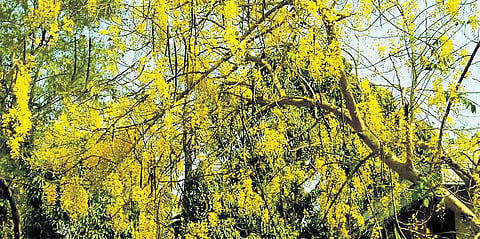

BENGALURU: As the forest department has undertaken a massive exercise to clear weeds, this time it has gone a step ahead and decided to clear the tall standing Senna spectabilis (golden shower) trees, which is an invasive species.
A pilot plot of 100 hectares is being cleared in Bandipur Tiger Reserve, but conservationists and retired foresters have questioned the method being adopted. The orders were issued around three months ago and so far, 20-30ha have been cleared.
Conservationists pointed out that though the intention is good, the method is not. The forest department has given the contract to a private agency, which is felling the trees and taking the trunks away. The roots are not being cleared, which is essential for clearing the weed. This is true especially of Senna, as it sprouts from lateral roots and grows fast.
“This kind of clearing will only lead to timber lobbying and the purpose of giving permission will be lost. The entry of workers, trucks and private companies, without doing a thorough job, raises a lot of questions. The Supreme Court in 2002 had ordered that unless it is cleared in the forest management plan and is for habitat improvement, nothing can be removed from the forests. In this case, though orders have been issued and the purpose is good, habitat improvement is not happening,” said a retired forest official.
Principal Chief Conservator of Forests, Wildlife, Subhash B Malkhade said that a pilot study has been undertaken and permission was given to an NGO three months ago. The NGO has also been told to find solutions on how to use the cut wood, whether to use it as fuel in the briquette industry or pulpwood industry. Clearing the cut wood will help improve the habitat for wildlife, just like efforts are being done for lantana and other weeds, he added.
According to forest officials, Senna was first introduced in Mudumalai as an ornamental species by the British. It has now spread to Bandipur, Nagarhole, Wayanad, MM Hills in Karnataka and even in the forests of Tamil Nadu and Kerala.